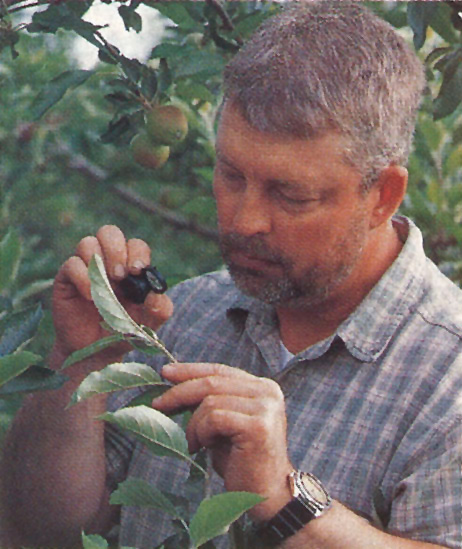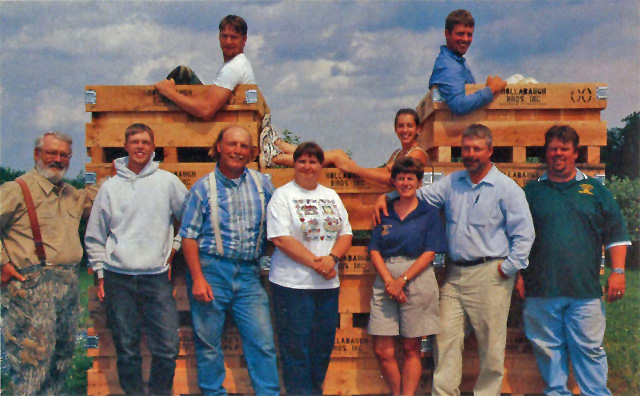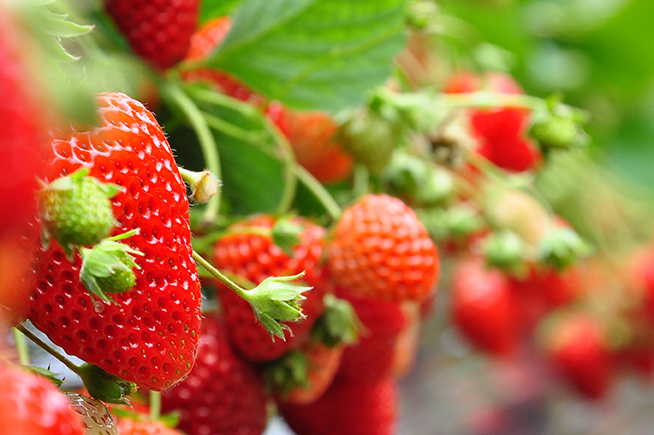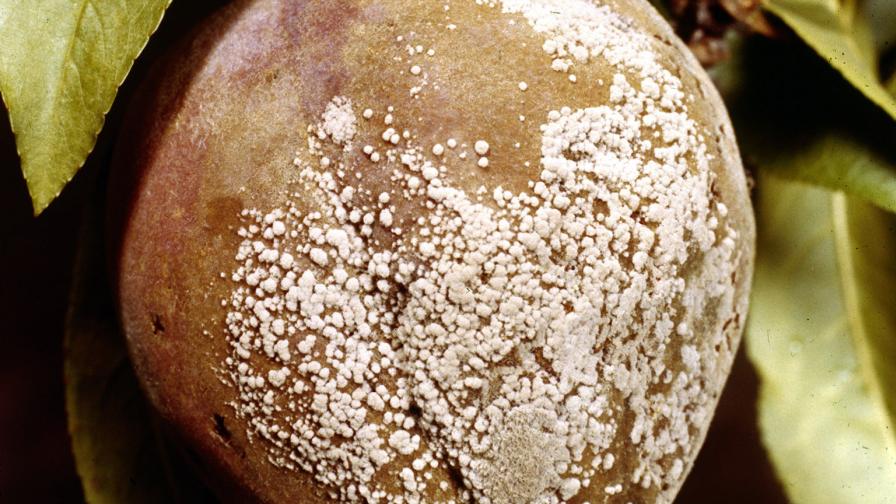Fruit Growing Is Brad Hollabaugh’s Vocation

Brad Hollabaugh (Photo credit: Steve Hollabaugh)
If we wanted to talk about someone who is outstanding in their field and dedicated to the future of his industry and fellow growers, then we’d have to talk
about none other than Brad Hollabaugh — this year’s American Fruit Grower® and Western Fruit Grower™ magazines’ Apple Grower Of The YearSM. It seems he was just meant for the role — born into it, really.
“I was born in a house on the farm — never made it to the hospital. Maybe that was destiny speaking to me, I don’t know,” he says chuckling. “I’ve been working on the farm since I was old enough to walk on my own and follow Dad around.”
And follow in Dad’s footsteps he did, until he felt the urge to try something a little bit different. So off to college he went in pursuit of a career in biology. But finding there was more satisfaction standing in his orchard looking through his 10x than sitting in a sterile lab peering through a microscope led him back home — for good.
“There is an association for the land and farming that I believe can only be nurtured by living on and growing up on a farm. That connection will either become fortified or weakened over time. Over the years, I have had many moments when I have questioned my decision to follow a career in the fruit industry,” he says frankly. “But as I look back over my lifetime on the farm, each time that question has been answered with a resounding ‘yes.’ I can’t imagine following any other career path. Fruit growing is my vocation!”
The Making Of The Business
Started in Biglerville, PA, in 1955, the Hollabaugh operation spans 513 acres — 425 in tree fruits and the balance in wood lots, farm ponds, lanes, and buildings. In addition to the wholesale element of the business is a thriving farm market where crop and variety diversification is key to keeping customers coming back throughout the season.
Apple production is the main focus at the farm — 300 acres of varieties such as Lodi, Summer Rambo, Paulared, Ginger Gold, Gala, Jonamac, Smokehouse, Jonathan, Empire, Red Delicious, Golden Delicious, Nittany, Rome, York, Ramey York, Braeburn, Spencerville Red, and Fuji. A number of test varieties are also under evaluation.
Nectarines (including Sun Glo, Flavortop, Fantasia, and Red Gold) and peaches take up another 70 acres. Peach varieties include Early Red Free, Sugar May, Early Breeze, Salem, Redhaven, White Lady, Bellaire, John Boy, Loring, Ernie’s Choice, PF 23, Sununer Breeze, Cresthaven, Blake, PF 27, Lady Nancy, White Hale, Encore, and O’Henry.
Pears and Asian pears are a part of the mix at 50 acres. Red Clapps, Canal Red, Bartlett, Seckel, Bosc, Hosui, Shinseiki, Twentieth Century, Seigyoku, Niitaka, Olympic, Shinko, and other varieties continue to be evaluated. And rounding out the plan are 5 acres of plums and apricots.
It’s All In The Training
Interestingly, Hollabaugh prefers maintaining his dwarf trees (340 to 515 trees per acre) as free-standing central leader or modified central leader systems.
“Growing a free-standing dwarf tree requires some attention to developing the girth of the trunk before cropping. Shall we say we learned the hard way how that relationship works,” he adds with a grin.
Those trees that can’t quite make it as free-standing are supported by stakes.
“There are probably as many pruning methods as there are fruit growers in the world!” he says. “But the best pruning/training tip I can suggest is to assure that the top canopy does not overtake the lower portion of the tree system and form an ‘umbrella’ format. For us, a regular program of limb rotation is also an important component of maintaining the productive nature of our orchards.”
Hollabaugh also tries hard to maintain consistent fruiting and uses this not only in tree shaping, but also to control vigor.
“Consistent fruiting is a tremendous aid in controlling vegetative growth,” he says.
Staying Ahead Of The Game
Varieties: For more than 30 years, the operation has been in a constant cycle of orchard rotation in peaches, nectarines, and apples.
“I always say that a grower who has stopped planting trees (or planning to plant trees) has already started to go out of business,” he says.
The farm has undergone a transition over the decades from mostly processing apple production on seedling rootstock to about 70% fresh fruit production on dwarfing rootstock.
“The high capital investment each year is difficult to make, since even one’s best planning cannot assure success of varieties in the marketplace,” says Hollabaugh. “We often choose fresh fruit varieties which have value as processing apples as well to safeguard against volatile markets.
He says planting strategies are focused on the farm’s marketing plans and industry trends.
Due to the long cycle of orchard plantings, it is difficult to always stay at the ‘head of the pack’ in terms of the best varieties to grow. By the time full production is achieved, the marketplace has often moved onto ‘improved’ varieties,” he says. “However, we have certainly been very progressive — and aggressive — in establishing high density apple production systems.”
Technology: Computer technology is an integral part of the Hollabaugh day-to-day business.
“In 1983 we purchased our first computer system and have been hooked ever since. We use our computers for communications, bookkeeping, databases, and many other functions,” he explains.
“I can’t imagine not working with a computer system in today’s world. More than just sending messages, email has become an essential part of communications with Extension personnel, as well as a means of delivering information in a much timelier manner than was possible in the past,” he says. “I can now access the latest newsletter on the day it is completed as opposed to receiving the same information in the mail sometimes a week to 10 days after production. Often the content of those letters is directly related to and used in conjunction with our own scouting and pest assessments throughout the year.”
And speaking of pest management, Hollabaugh is impressed with Skybit, a company that provides weather forecasting and modeling for insect and disease problems for apples.
“Skybit’s forecasts are generally more reliable than most other weather reporting services in our area. The insect and disease models are terrific in terms of assisting with our general pest management program,” he says.
This is really important to Hollabaugh because when he says “our pest management program” he means just that.
The family doesn’t use consultants to put together their programs, they do it themselves. That’s a bit unique these days when you consider the complexity of controlling pests in today’s environmental and legislative environment.
Speaking Of Legislative Environment
Hollabaugh is not only involved in the growing aspects of the operation but also in the (unfortunate) politics of it.
“The plethora of regulations that have been dumped upon production ag over the last decade is more than oppressive,” he laments. “Twenty years ago one might have spent 10% to 15% of their time on matters related to regulations whereas today, regulations – in all their tenuous ways —now affect our schedules 50% to 60% or more of the time.”
Finding good, legal labor — when it’s needed — and increasing EPA regulations are two of Hollabaugh’s concerns.
“Our liabilities in each of those areas have grown astronomically over the years while protections have tapered off at the same rate,” he says. “One gentleman from the U.S. Department of Labor stated that agriculture was the most regulated industry in the country. I believe that statement to be true!”
The Food Quality Protection Act (FQP A) has thrown a wrench into the operation’s IPM program.
“I have written countless letters, attended meetings, and met with representatives about the conflict that is developing with FQPA,” he says. “On one side, the search for the best IPM practices is ongoing. The other side is pressing for a reduction in pesticides. The two concerns are not consistent in practice or philosophy.”
Having Focus
Through all the regulatory challenges the Hollabaughs are still able to make a success out of their business — with a solid marketing focus.
“Direct-to-consumer marketing is a key element in our marketing plan,” he explains. “We have added school tours, Elderhostel tours, and fruit gift shipping over the years to supplement our marketing efforts.”
Another important part of the marketing plan has been the steady establishment of a so-called “trucker trade.”
“Currently, we sell much fruit f.o.b. But our main business has developed through the ability to deliver fruit products. Our sales range from Vermont to Florida and from Pennsylvania to Iowa. Developing a wide range of customers has been essential to fortifying our marketing base,” he says. “We also do much trade in ‘spot-picked’ pears and apples. Over the years, consistent quality and consistent product packaging have been a trademark of our enterprise. That consistency has allowed us not only to keep good customers, but also has provided the basis to maintain a premium price on our products. A company can only stand firm in the fruit marketplace if they have the credentials and product quality to back up their position.”
Having a clear focus on what he’s wanted to achieve for his business and for the industry and having the ability to make it happen are what has made Brad Hollabaugh an Apple Grower Of The YearSM.

It’s all in the name of family cooperation at Hollabaugh Bros. In the bins, left to right: James Hollabaugh (Harold’s son), Ellie Hollabaugh (Brad’s daughter), and Bruce Hollabaugh (Brad’s son). In front of the bins, left to right: Donald, David Hollabaugh (Harold’s son), Steve, Vicky Hollabaugh (Steve’s wife), Kay (Brad’s wife), Brad, and Neil. (Photo credit: Steve Hollabaugh)
Family A Key Part Of Hollabaugh’s Success
Brad Hollabaugh may be the name that’s engraved on the award, but he is quick to note the honor is not his alone. Behind it is a longstanding history of family cooperation, so in his words, he’d like to give credit where credit is due.
Hollabaugh Bros., Inc. has been a Family Farm Corporation since March, 1982. From 1955 to 1982, Hollabaugh Brothers was a partnership started by my father, Donald P. Hollabaugh and his twin brother, Harold J. Hollabaugh. My brothers (Steve and Neil) and I officially joined the business when we incorporated in 1982.
Donald, 68, is president and is still actively involved in the business. His responsibilities include co-management of our pest management program, consultation, and support of general field operations.
Harold, 68, is also involved in the application of our spray program, field nutrition, maintaining our small tree nursery, and assists with many field operations. Steve, 46, and our photographer, is responsible for our bin construction enterprise, container management and trucking, maintenance, and assists with wholesale sales.
Neil, 41, is our sales manager for wholesale operations and assists with labor management and field operations. He is also involved with equipment maintenance and works closely with the retail market operation.
Kay, 44, my wife, does much of our office work, accounting, and data entry. She is also the manager of our retail fruit market and has initiated many of our successful marketing ventures —our Annual Peach Festival, Apple Festival, and bus tours. Kay is a member and past president of the board of directors of the Pennsylvania Apple Marketing Board, a member of the board of directors and ag committee chairwoman of the Gettysburg-Adams County Area Chamber of
Commerce, and a member of the board of directors of the North American Farmers Direct Marketing Association.
Vicky, Steve’s wife, works at the fruit market, acts as our shipping manager, and assists with office work.
Neil’s’ wife, Georgia, is an elementary music teacher and helps at the market during busy festival events.
In addition, most of the owners’ children are involved in both the orchard and the market operations.
Finally, my responsibilities include general business and personnel management, harvest coordination, and communications. Although our family board acts as the governing body, I am frequently the “messenger” for the company and often develop the procedures for implementing our business plans.
Keeping Up With Brad Hollabaugh
One of the criteria that a potential Apple Grower Of The YearSM must meet is having a history of positive contributions to the industry. At just 44 years old, Brad Hollabaugh has done more in this area than many folks can even imagine doing in a lifetime. His is one impressive resume:
Education: Graduate Biglerville High School, 1974; attended Gettysburg College 1974-1976
Family: Married to wife Kay for 23 years; son, Bruce (20), junior horticulture major at Penn State;
daughter, Ellie (16), junior at Biglerville High School.
Community Activities: Member Trinity Lutheran Church; served on the church council from
1978-1984 and from 1994-2000 as president of the congregation. Upper Adams School District
Board of School Directors 1988-1992, 2000-present
Professional Involvements: State Horticultural Association of Pennsylvania – board of directors; chairman of legislative committee; contributes monthly article to the Pennsylvania Fruit News magazine; PA Horticultural Trade Alliance delegate; PA Farm Show committee; Annual Mid-Atlantic Fruit & Vegetable Conference program and convention committee; strategic planning committee
Adams County Fruit Growers Association — legislative committee chair; contributes article to monthly newsletter; charter member of the former labor committee that initiated the Agricultural Human Resources Management Association; past board member and officer, two terms; initial contributing member of consortium to initiate the “Ombudsman Program” for Rafael Ramos, Ag Human Relations Consultant for Growers in Adams County; assist in Annual Apple Blossom Festival with bus tours and clean-up
Co-founder of Harvest Management Systems, a software company supporting the fruit industry for payroll, labor management, and harvest yield accounting (1985-1996); helped design/write the Harvest Management System Payroll/Labor Management program; marketed and supported the HMS system for more than 10 years. System design/support turned over to Esh Computer Systems, Gap, PA.










